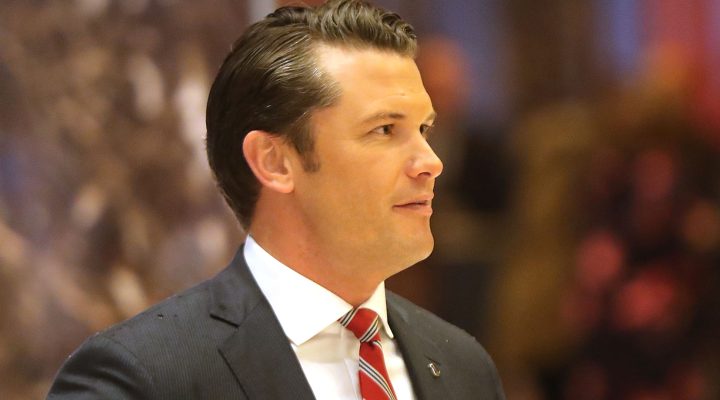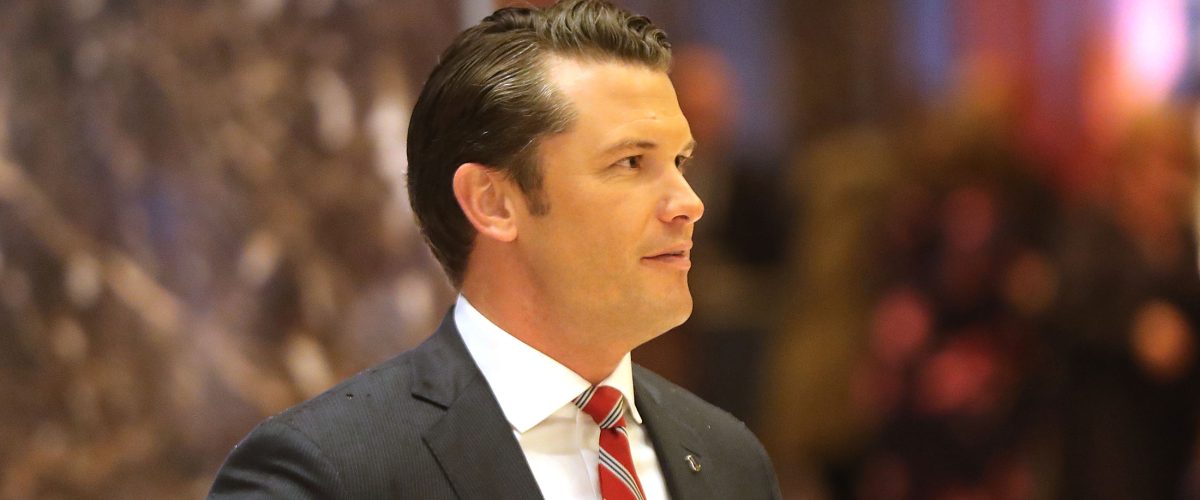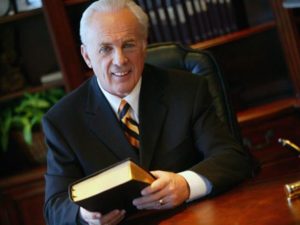Given the state of their churches, it makes total sense that conservative evangelicals would elect a president who has a history of bragging about sexual assault. And it also makes sense that this sexually abusive president would nominate five people to his cabinet who have been accused of sexual abuse: Matt Gaetz, Pete Hegseth, Elon Musk, Robert F. Kennedy Jr., and Linda McMahon.
Thankfully, Gaetz has withdrawn his nomination after even Trump realized the votes for confirmation were not to be found in the Senate.
In the case of Hegseth, the accusations stem from a 2017 incident where a woman who ended up in his hotel room claimed he wouldn’t let her leave, took her phone away and sexually assaulted her. Video surveillance showed Hegseth and the alleged victim together at the hotel pool around 1:30 a.m., when hotel employees confronted him for being loud and disorderly. Upon being confronted, Hegseth began yelling about having freedom of speech. So the victim apologized for him and walked him toward his room. Hotel employees said Hegseth appeared “very intoxicated,” while the victim was “very coherent.”
While the woman still insists she was raped, Hegseth declares their extramarital sexual activity was consensual.
 While five of Trump’s nominees have been accused of some form of sexual abuse, Hegseth is unique because he reportedly attends Pilgrim Hill Reformed Fellowship, which is part of the Reformed Reconstructionist “New Christendom” movement led by Doug Wilson, the pastor who famously tells women to call their husbands “lord” and says, “Men dream of being rapists.”
While five of Trump’s nominees have been accused of some form of sexual abuse, Hegseth is unique because he reportedly attends Pilgrim Hill Reformed Fellowship, which is part of the Reformed Reconstructionist “New Christendom” movement led by Doug Wilson, the pastor who famously tells women to call their husbands “lord” and says, “Men dream of being rapists.”
Even though sexual assault involving intoxication may be an unfortunately common human story, there is a unique culture among these conservative Calvinist men that mixes entitlement, misogyny and alcohol. And since Trump is attempting to fill his cabinet with these men, we need to start exposing the culture these men build behind closed doors when they’re not dressed up in suits and ties and posing for their congregations.
As I reflect on my time in these churches, it’s easy to see how men like Hegseth would thrive and increase their power to the point of harming women and belittling men who they think are too much like women.
Complementarian Calvinist power
When I was fresh out of fundamentalism in 2004, I joined the “Young, Restless and Reformed” movement that compensated for insecurity with Calvinism, church planting, male headship and beer. I moved across the country to Denver to start a church with a 27-year-old TheoBro who thought he was qualified to start a church with zero experience and a master’s degree.
In these conservative complementarian Calvinist churches, only men are in charge. And church elders hold absolute authority. So men are taught to embrace their authority in the church, home and society.
Seven years of spiritual abuse later, our pastor’s wife divorced him and the leaders of the church asked him to step down. But he spent the next six months threatening us if we didn’t call him back he’d start another church in the neighborhood. We were young. And he wore us down and isolated us from the congregation until we all decided to leave. Then he had a few of his buddies appoint themselves as elders and call him back to be the pastor.
What resulted was multiple additional church splits and brand new names spanning two decades with the same few TheoBros in charge.
Poker night
As we were first starting out two decades earlier, we wanted to reach men in the neighborhood by making them think we were cool. So we met for a men’s poker night in the house of one of the guys who eventually would become one of the self-appointed elders.
 I walked up to the door that evening, having grown up being taught biblical wine was watered down grape juice, to experience my first evening of beer and poker with the men. Despite not wanting to have anything to do with the independent fundamental Baptist movement of my childhood, something about drinking alcohol still felt spooky to me. And in the couple of occasions when I took a sip of wine or beer, I didn’t like it at all. But there was one drink I liked.
I walked up to the door that evening, having grown up being taught biblical wine was watered down grape juice, to experience my first evening of beer and poker with the men. Despite not wanting to have anything to do with the independent fundamental Baptist movement of my childhood, something about drinking alcohol still felt spooky to me. And in the couple of occasions when I took a sip of wine or beer, I didn’t like it at all. But there was one drink I liked.
So when we were instructed to bring our own drink, I picked up a six pack of Smirnoff Ice, drove to the TheoBros’ house and knocked on the door.
‘A woman’s drink’
The moment I walked in, the other men began looking down at my Smirnoff Ice and started snickering. One comment led to another, and then suddenly I was the center of attention.
“What is that?” one guy asked.
“Look what Rick brought!” laughed another.
“Why’d you bring a woman’s drink?”
“A woman’s drink?” I quietly thought to myself. “But if I like the taste, what does being a guy have to do with anything? I’m not going to bring a drink I don’t like just to be cool.”
Apparently, Smirnoff Ice being a woman’s drink is a common theory among some TheoBros. JD Hall, who was found guilty of embezzling money from Fellowship Baptist Church in Sidney Mont., wrote for Pulpit and Pen, “James White announced that he drinks Smirnoff Ice.” Then he added, “I thought that was a lady’s drink.”
When I posted this story on social media over the weekend, I received way more responses than I imagined I would.
One response came from a man who my former pastor used to make fun of. He shared a similar story. “I went to a men’s campfire night, BYOB, at a church we were considering joining,” he wrote. “Brought my favorite Innis & Gunn imported Scottish beer. They mocked it all night, expressing disgust that I wouldn’t bring local brews. I was so bummed at their attitude to me.”
“I have also been laughed at for bringing a woman’s drink.”
Someone else said they “got made fun of for starting to drink seltzers over beer.”
“I have also been laughed at for bringing a woman’s drink,” relayed another.
Then someone shared the story of her vegetarian husband going to a “Band of Brothers” retreat at their church, when suddenly he was being mocked for not eating the venison.
A few women responded by saying they get made fun of for drinking supposedly “masculine” drinks.
Then another added: “You mean you didn’t bring the ghost pepper micro-brew?! The bro culture is so ridiculous. I mean, does anyone *really* enjoy peppers with 100,000+ scovilles of heat? Is that why they must be consumed in public with a circle of one’s best mates to cheer/taunt?”
One friend said, “I have yet to see the delineation at a grocery store or a gas station that says women’s drinks and men’s drinks.”
And one lamented, “Oh, the bizarre ways masculinity is defined by conservatives in churches.”
It’s just dudes having fun
While many of the responses to my post joined in ridiculing the misogyny of TheoBro culture, others claimed it was just men joking around and having fun.
But while it’s totally understandable for men to joke around, it’s notable that so many of these men naturally gravitate toward sexually coercive jokes that put women down or that put other men down because they aren’t manly enough.
While drinking alcohol can lead people to do things they regret, it also lowers your inhibitions to let your words flow more freely about what you may be thinking or feeling.
According to Aaron White, leader of the National Institute on Alcohol Abuse and Alcoholism’s Epidemiology and Biometry Branch, alcohol “makes us more likely to say whatever’s on our minds.”
Beer and mission
One of the most misogynistic men in evangelicalism is John MacArthur, who argues that authority and submission between men and women “pervade the whole universe.”
But despite being intoxicated with his male-dominated glory hierarchy, MacArthur is not a fan of the conservative Calvinist movement’s obsession with beer.
“For some who self-identify as ‘Young, Restless and Reformed,’ it seems beer is a more popular topic for study and discussion than the doctrine of predestination,” MacArthur said. “They devote whole websites to the celebration of brewed beverages. They earnestly assure one another ‘that most good theological discussion has historically been done in pubs and drinking places.’ They therefore love to meet for ‘open dialogue on faith and culture’ wherever beer is served — or better yet, right at the brewery. The connoisseurs among them serve their own brands and even offer lessons in how to make home brew.”
“It’s clear that beer-loving passion is a prominent badge of identity for many in the YRR movement,” he continued. “Apparently beer is also an essential element in the missional strategy. Mixing booze with ministry is often touted as a necessary means of penetrating Western youth culture, and conversely, abstinence is deemed a ‘sin’ to be repented of. After all, in a culture where cool is everything, what could be a better lubricant for one’s testimony than a frosty pint?”
MacArthur’s words here accurately represent my experience with alcohol in the YRR movement. To us, it was a way of getting men on mission. The problem, as we’ve seen come to fruition through the reelection of Trump and the authoritarian abusers he’s nominated, is in what that mission is.
Mocking transgender people
“The men of America are rising up,” Christian nationalist worship leader Sean Feucht posted on election night.
Earlier this year, when Feucht met with one of his favorite TheoBro pastors, Mark Driscoll, the two of them began pontificating about how “balls” are what’s missing in America. In case Feucht and Driscoll repeating the word “balls” back and forth wasn’t clear enough, Driscoll emphasized, “That’s what’s missing. The de-masculination of men.”
They claimed Kamala Harris surrounded herself with eunuchs like Jezebel in the Bible.
So now add alcohol to the mix.
In a conversation between Jeff Durban, Toby Sumpter and Doug Wilson on Apologia Studios titled “Three Pastors and a Beer,” Durban opened by asking, “Ready to fight?” Then with the three of them giggling, Sumpter asked, “Are we arm wrestling?” Wilson and Sumpter held out their hands toward each other and quickly pulled them away.
Then Durban, who already had drunk half his beer, asked, “Should we force women to wax men’s testicles?”
The three men burst into laughter. Then lifting his beer, Durban added, “We’ll start it the right way.”
Wilson compared forcing women to wax men’s testicles to forcing a diner in Birmingham, Ala., to serve a Black or Jewish person. And it wasn’t until 3 minutes later that you discover they were really criticizing a transgender person named Jessica Yaniv in British Columbia who sued 13 salons for refusing to wax her pubic hair.
And while the legal case or story of Yaniv may be complex, the reality is these Reformed men were using her story while drinking alcohol to belittle a transgender woman as being a lesser man than them — with a dose of racism on the side.
Guns, beer and transgender women
In 2023, conservatives began a boycott of Anheuser-Busch in response to a social media promotion featuring actress and TikTok personality Dylan Mulvaney, a transgender woman.
Soon after, Driscoll posted: “I don’t drink beer, but if I did, it wouldn’t be anything from Tranheuser-Busch. Grab some whiskey instead.”
Other conservatives were so irate about the ad they began sharing videos online of them shooting Bud Light cans or setting Bud Light boxes on fire.
Kid Rock responded by creating his own video of him wearing a MAGA hat and saying: “Grampa’s feeling a little frisky today. Let me say something to all you and be as clear and concise as possible.” Then Rock cocked his automatic rifle and shot four boxes of Bud Light. With the gunsmoke settling, Rock pointed his middle finger to the camera and says, “F**k Bud Light! F**k Anheuser-Busch! Have a terrific day!”
This conservative anger eventually led to a bomb threat against one of Anheuser-Busch’s facilities.
And did these evangelical pastors do anything to quiet the rage?
Driscoll added again on Facebook, “I’ve been telling you boys for years. Light beer? It’s a gateway. Stick with whiskey.”
A disavowal of women
These men aren’t living out of an appreciation for who they are. They’re afraid of gateways toward men becoming like women.
In I Don’t Want to Talk About It: Overcoming the Secret Legacy of Male Depression, Terrance Real explains: “When researchers asked girls and women to define what it means to be feminine, the girls answered with positive language — to be compassionate, to be connected, to care about others.”
“Boys and men, on the other hand, when asked to define masculinity, responded with double negatives. Boys and men do not talk about being strong so much as about not being weak. They do not list independence so much as not being dependent. They do not speak about being close to their fathers so much as about pulling away from their mothers. In short, being a man generally means not being a woman. As a result, boys’ acquisition of gender is a negative achievement. Their developing sense of their own masculinity is not, as in other forms of identity development, a steady movement toward something valued, so much as a repulsion from something devalued. Masculine identity development turns out to be not a process of development at all but, rather, a process of elimination — a successive unfolding of loss. Along with whatever genetic proclivities one might inherit, it is this loss that lays the foundation for depression later in men’s lives.”
In the case of Hegseth and the conservative Reformed movement, it makes total sense why they’d put down women and men who choose “a woman’s drink.” They want us to think they’re simply being men, and biblical men at that. They claim they’re against transgender people because they’re being faithful to Scripture.
But in reality, all their demeaning language and violence toward women, transgender people and supposedly lesser men in their taking of power are in service of one thing — an underlying repulsion and devaluing of women.
Rick Pidcock is a 2004 graduate of Bob Jones University, with a bachelor of arts degree in Bible. He’s a freelance writer based in South Carolina and a former Clemons Fellow with BNG. He completed a master of arts degree in worship from Northern Seminary. He is a stay-at-home father of five children and produces music under the artist name Provoke Wonder. Follow his blog at www.rickpidcock.com.
Related articles:
It’s Pete Hegseth’s theology that ought to concern us | Analysis by Mark Wingfield
Here’s how toxic male supremacy keeps on infecting the church, even in a supposed ‘apology’ | Analysis by Rick Pidcock






